A Summer Night in Marzamemi, Sicily: Wine, Pasta, and the Slow Burn of a Sicilian Evening
It was a table in the piazza. A glass of something red. And the slow, delicious certainty that, for tonight at least, there is nowhere else in the world I’d rather be but here.
If you ever happen to find yourself wandering in Sicily—let’s say you’ve accidentally fallen off a cruise ship and swam to shore, or it could be that you’re hiding out and on the run from Interpol, or perhaps there is a more plausible explanation. Like maybe, just maybe, you’re a person with taste. Then dear reader, you owe it to yourself to get lost in an evening in Marzamemi. This tiny hamlet was not part of the glossy brochures that you might pull off of your swanky hotel tourist information rack. However, if you made the right choice and find yourself strolling here on these warm, salt-stained streets where the Mediterranean sighs, and time, in the most perfect Italian way possible, simply shrugs and throws its hands up as if to simply say “I don’t know. Why are you asking me?”
We strolled slowly down Via Letizia. It was less of a Sicilian street and more of a suggestion. The air hung heavy with the perfume of lemon trees and that faint, eternal ghost-like aromas of anchovies. There was this thick scent of the sea in the distance that seemed to follow you with every step. This tiny town was the kind of place where every stone was ancient history, and where the locals walked with the unhurried confidence of people who knew they lived somewhere worth savoring slowly. The orange glow of the sun bathed the stone buildings and cobbled streets. It cast long shadows over the people milling about who were chatting, laughing and taking in the evening flair. I was spending the day with my friend Arianna, a Sicilian winemaker who had the kind of suntan that said, “I work outside for a living, and I’d rather die than drink Prosecco.”
We strolled in a painting, past ochre houses with turquoise shutters and lazy cats who looked at you like you were the one trespassing. The evening was warm. It was Sicilian warm. The air held the promise of another slow, boozy night filled with conversation and food to end a day of driving along the Sicilian coast. The sun was bleeding out over the rooftops, and everyone, no matter what age, was still taking their sweet time getting ready for sunset, dinner and a little wine. The locals here didn’t walk, they glided. Couples here held hands like they invented romance. Old men traded insults that sounded like poetry and friendly banter. Children, sticky with gelato, chased each other in circles, their shrieks bounced off the honey-colored stone walls and streets. This was truly la dolce vita, but with fewer Ferraris. more Fiats missing hubcaps and leaning multicolored Vespas all parked in rows.
We wandered towards the Chiesa antica della Madonna del Carmelo. A name that was definitely a mouthful. It was a church so beautiful and so old that you half expected Caravaggio to be lurking in the shadows, smoking a cigarette and painting the scene. Built by Baron Bernardo Calascibetta—who, I’m guessing, had more money than sense and a fondness for tuna—the church was a squat, elegant reminder that Sicilian faith was as sturdy as the ageless buildings that surround it. The stone was sun-bleached and pockmarked. The façade a patchwork of centuries’ worth of prayers, weddings, and funerals. We sat on a bench outside, pretending not to be tourists, and watched the locals drift by and engage in “la dolce far niente”—the sweet art of doing nothing.
A young couple strolled by us locked arm in arm, practically inseparable. Earlier, just down the street, they were locked in a heated argument, but had since made up, the disagreement completely forgotten. An old man adjusted his hat as though it was an Olympic event. Next to him, his dog was laying down on the cobblestones so content with life you had to wonder if the fur monster had figured out the secret to happiness. I turn to Arianna. “You really could never get tired of this.” I exhaled. She laughed, tossing her long, black hair back and lifting it to give her neck some relief from the heat. “Never. But you should see it in February—then it was just me, the priest, and the wind.” Time seemed to not exist here. Everything moved with its own graceful tempo completely oblivious to the ticking sounds of my Vortic converted 1941 Hamilton GCT watch. The tick, tick, ticking seemed to echo loudly around us, as if time seemed to shrug off the clicking persistence.
The bells of the nearby church chimed, as they always did, and we stood up and drifted across the piazza to Donna Nina, a restaurant that felt like it had been here since the concept of dinner was invented. The tables were scattered outside, under strings of lights that flickered like fireflies against the darkening sky. The piazza was a sun-warmed stage—filled by day, emptied by humid afternoon, and filled with the gentle chaos of pre-dinner anticipation and evening strolls. We sat outside to admire the randomness of the evening, two travelers of life, settling in. Arianna wasted no time, beckoned our waiter over, and ordered a bottle of Etna Rosso Riserva, 2015 Signum Aetna By Firriato. Our waiter nodded approvingly and rushed off to the wine cellar to retrieve the bottle. The wine was as dark as a volcanic night, with enough swagger to make a Bordeaux flush with envy. We eagerly lifted our glasses to toast and took a sip of the inky syrup. It tasted like lava, cherries, and the gentle secrets whispered under the Sicilian olive trees in a lush grove. It was the kind of wine that made you want to confess your sins to a priest, or at least to your drinking companion, or perhaps both if they were the same person.
As the humidity lingered around us, carried on the sea breeze through the tiny piazza, I ordered the burrata with pomodori pachino. Burrata, for the tragically uninitiated, was mozzarella’s overachieving cousin—a globe of creamy, unctuous cheese with an inside softer than a love song. The tomatoes, again for the ill informed, were a specific type of fruit grown in the area surrounding Pachino, Sicily, Italy. They were known for their sweetness, juicy texture, and vibrant red color which popped off of the plate, and beckoned us to tear into them. Pachino was to tomatoes what the Vatican was to Catholicism—holy, revered, and not to be trifled with. Ever! The burrata was a pale orb perched atop a riot of Pachino tomatoes so red they look illegal. A drizzle of olive oil, a dusting of salt—it was simplicity at its most subversive. Arianna broke the burrata open, tearing it like a surgeon with a scalpel. We watched the burrata spill its milky insides over the luscious, tiny tomatoes. The cream was intoxicating. It mingled with the tart sweetness of the tomatoes and the briny tartness of the local olive oil. The last bite of salt crunched its way into our palate and put a diabolical joy on the aftertaste. It’s the kind of dish that made you believe that there definitely was a God. But if you were a complete atheist, then it at least made you believe that good cheese actually did exist.
We ate in slow motion, savoring every bite, every mouthful. Each taste was a small, edible masterpiece. Around us, the piazza awakened. It stirred back to life as families arrived. Babies in strollers, grandmothers in black, and young lovers who just couldn’t keep their hands off each other, all spilled back into the small, connected streets, and the open piazza. The air was overflowing with laughter, conversation, and the distant sound of a Vespa taking off down the street. It was the communal hum of Sicily, a symphony of appetite and anticipation. An intoxicating peek into the beating heart and soul of a small town on the coast of Sicily.
Then, came the pasta: spaghetti con ragù di polpo, crema di finocchio e mandorle tostate. For those that don’t speak Italian, it was the spaghetti with octopus ragù, fennel cream, and toasted almonds. This dish was a study in restrained beauty and gastronomical indulgence. The sauce was deep, briny, and mysterious. The octopus was cooked to that perfect point. It was yielding and almost tender. The fennel cream was a soft, a licorice-scented cloud, lightening the heft of the sauce, while the toasted almonds added a crunch and a nutty whisper. It was, quite simply, sublime. This dish was an example of how the creativity of food was linked by both a place and of a people. Twirling and inhaling the deep aroma of this dish, I thought about making this at home when I returned. Upon taking the very first bite, I immediately realized that I shouldn’t even try.
We ate. We drank. We laughed. We indulged. The wine, much like the night, was deep and endless in our glasses. The last rays of sun slipped away below the rooftops and finally below the horizon, out of site. The piazza was lit only by the golden glow of the restaurant, the twinkle of streetlamps, and the shimmering expectation that something wonderful was always just around the corner. As with every single meal, it always ended too soon. But that was Sicily for you—just when you thought you’ve had enough, she pulls you in for one more dance, or one more deep, longing, and intimate kiss. We paid the bill, and took the bottle to enjoy the remaining glasses on the beach. We wandered back into the night, the stones still warm under our feet.
Marzamemi at night was a different animal all together. The crowds thinned, the air cooled, and the village exhaled deeply as if it breathed a sigh of relief. The sea was a dark and silent witness. The fishing boats bobbed gently in the harbor. The only sounds were the distant clinking of glasses, the low murmur of conversations, the sounds of cutlery on plates punctuated with laughter and occasional song. We walk in companionable silence. The streets were empty but somehow, very much alive. The crooked alleyways constantly writing and rewriting the story of this tiny town. Above us, the stars appeared, indifferent and eternal. In this tiny, forgotten corner of Sicily, on a warm summer night, with good wine, good food, and better company, the world felt, for once, exactly as it should be. It was a table in the piazza. A glass of something red. And the slow, delicious certainty that, for tonight at least, there is nowhere else in the world I’d rather be but here.

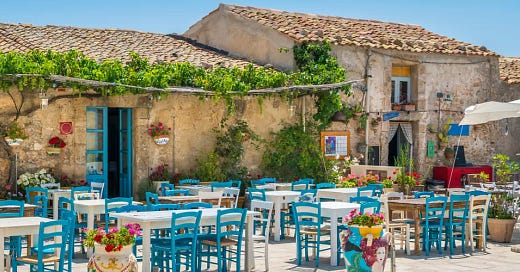



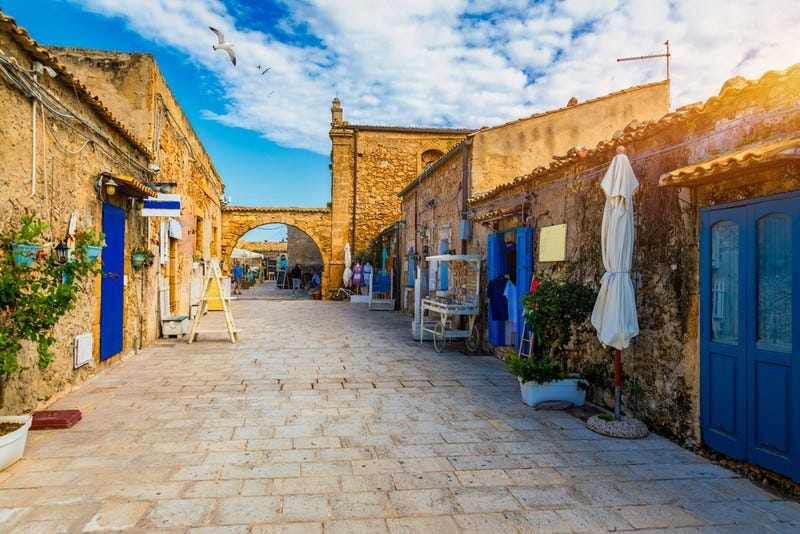
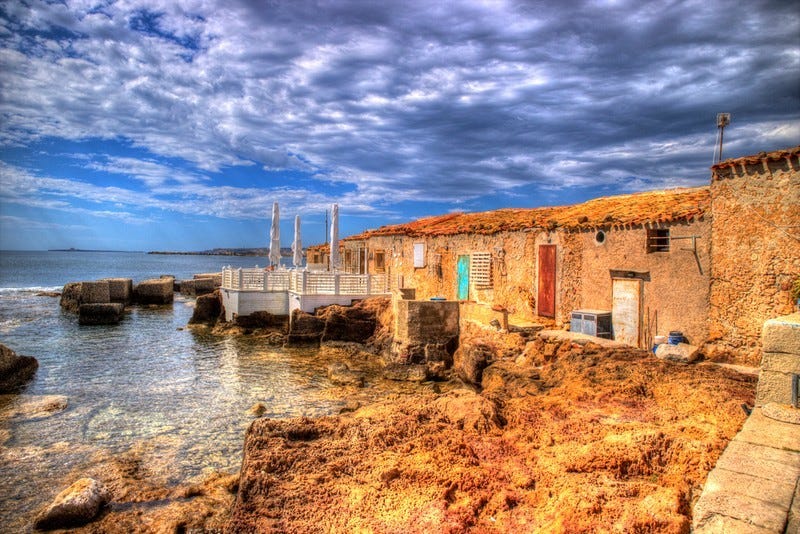
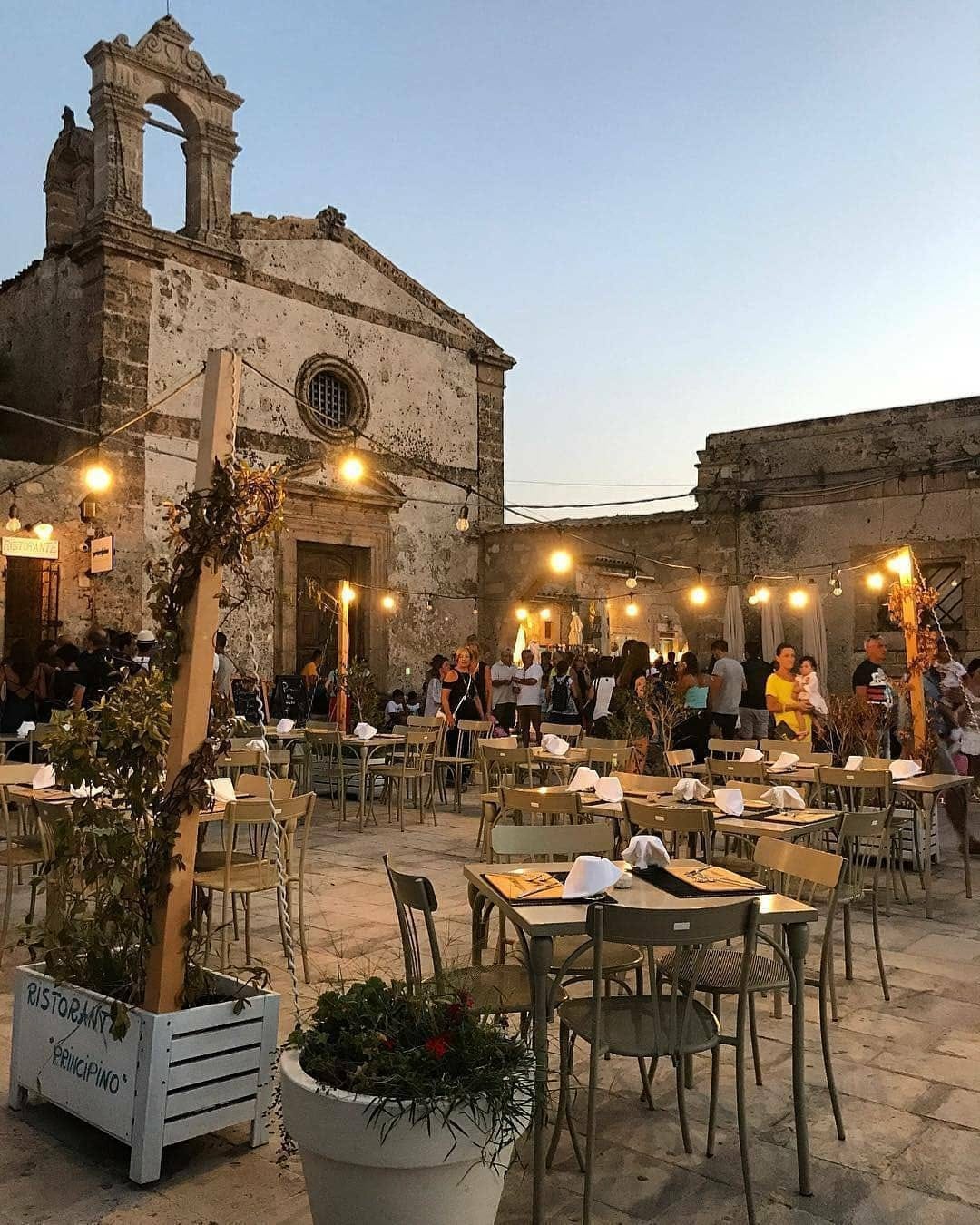
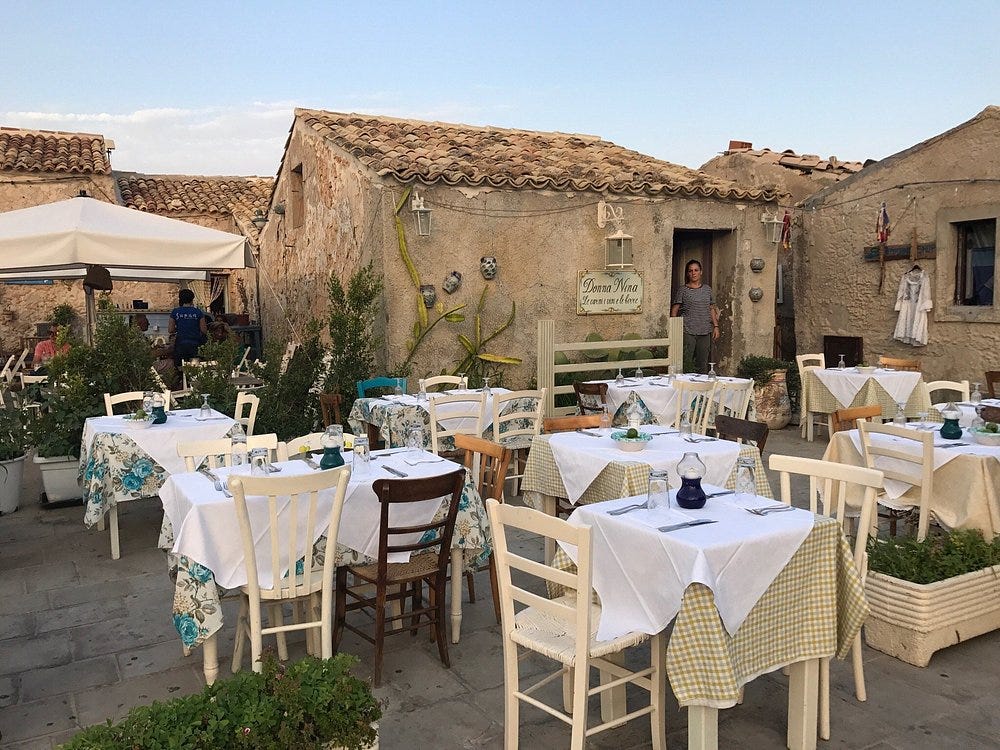
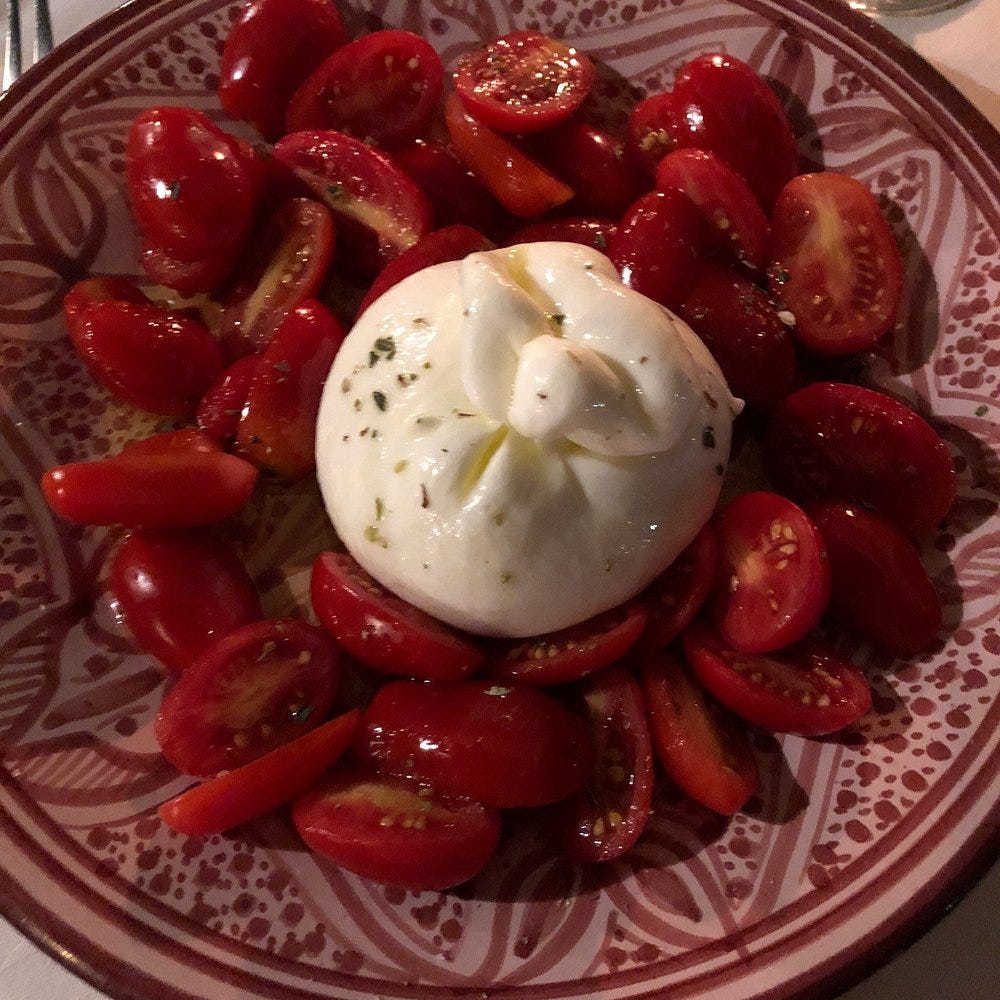
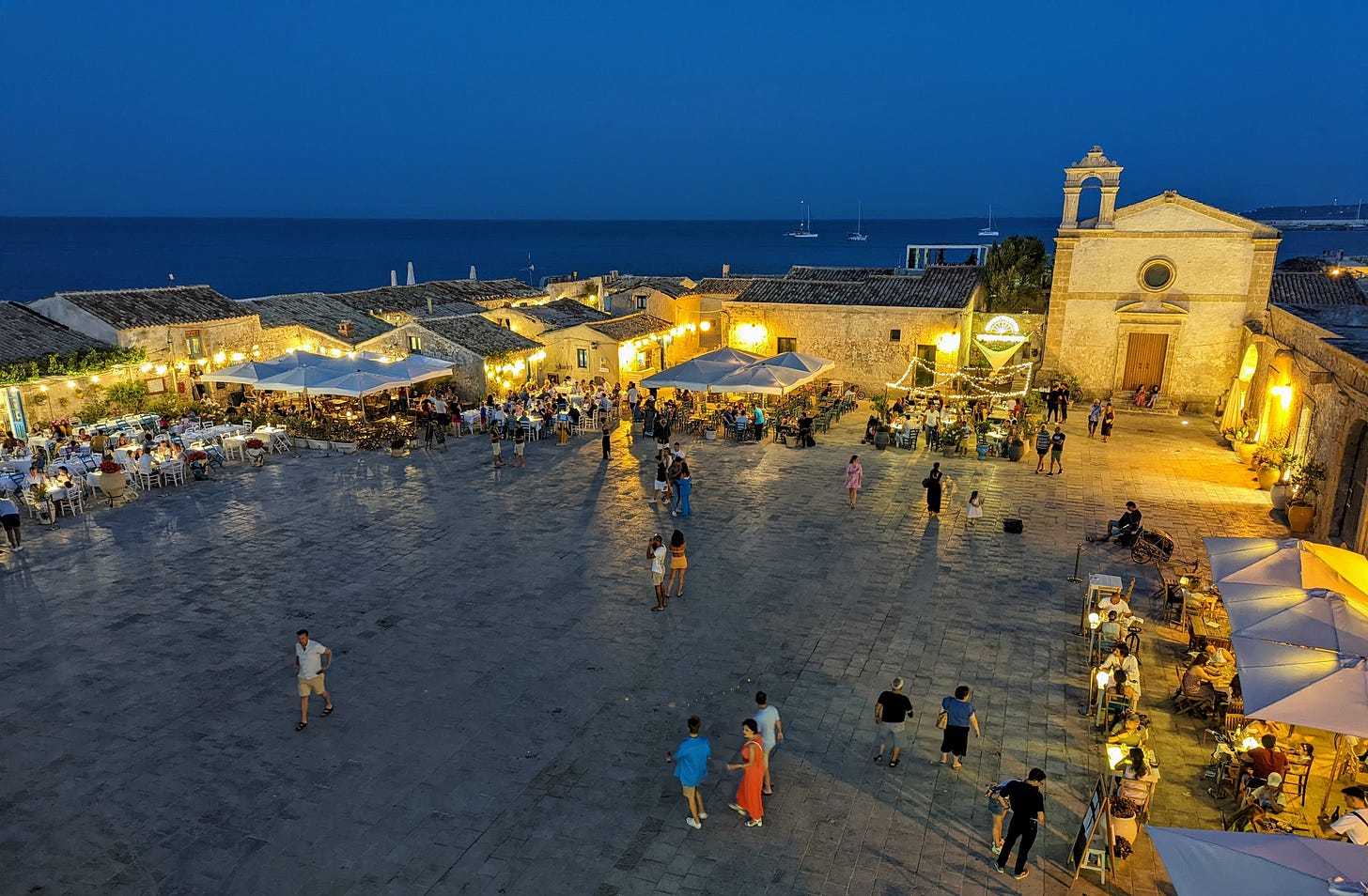
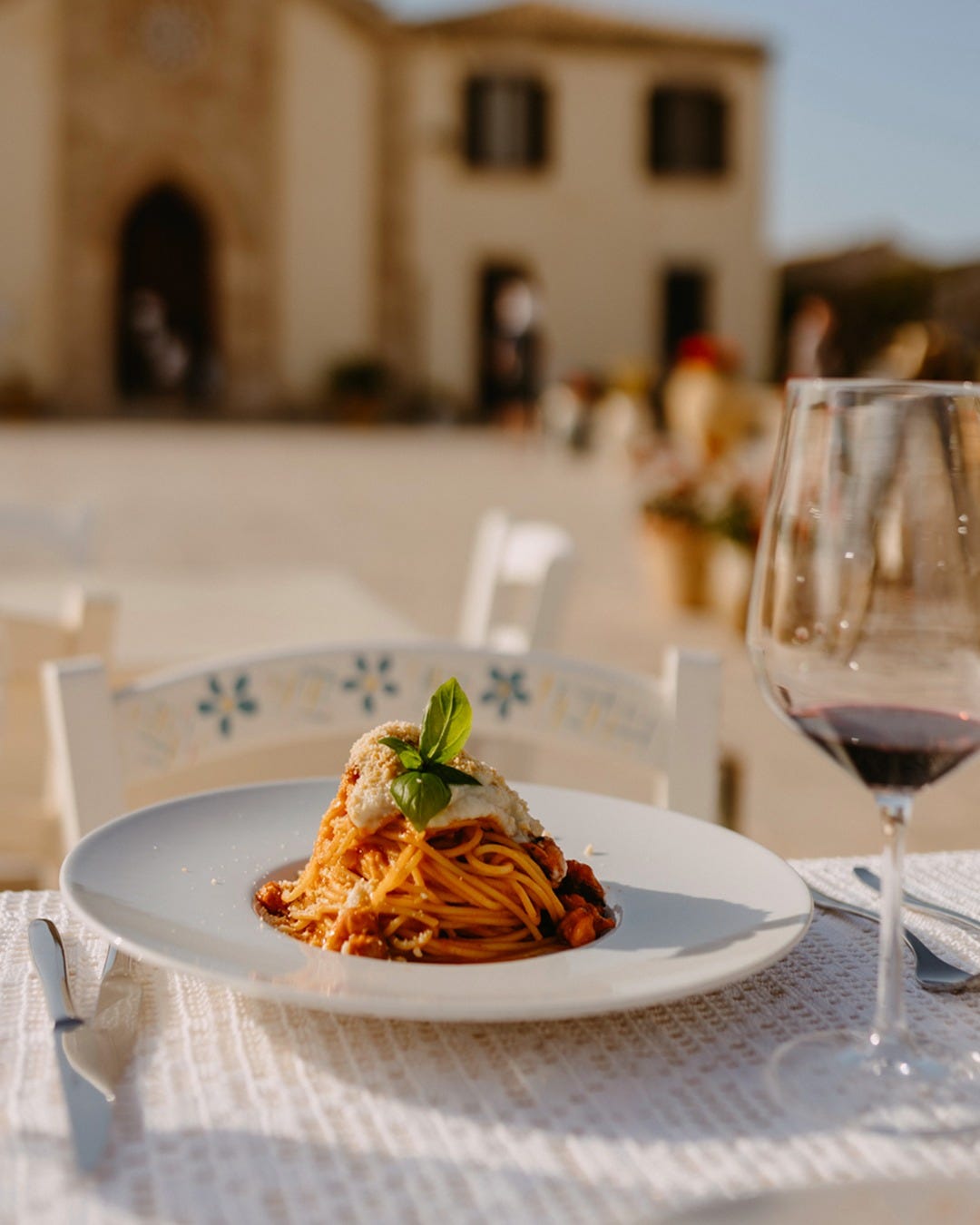
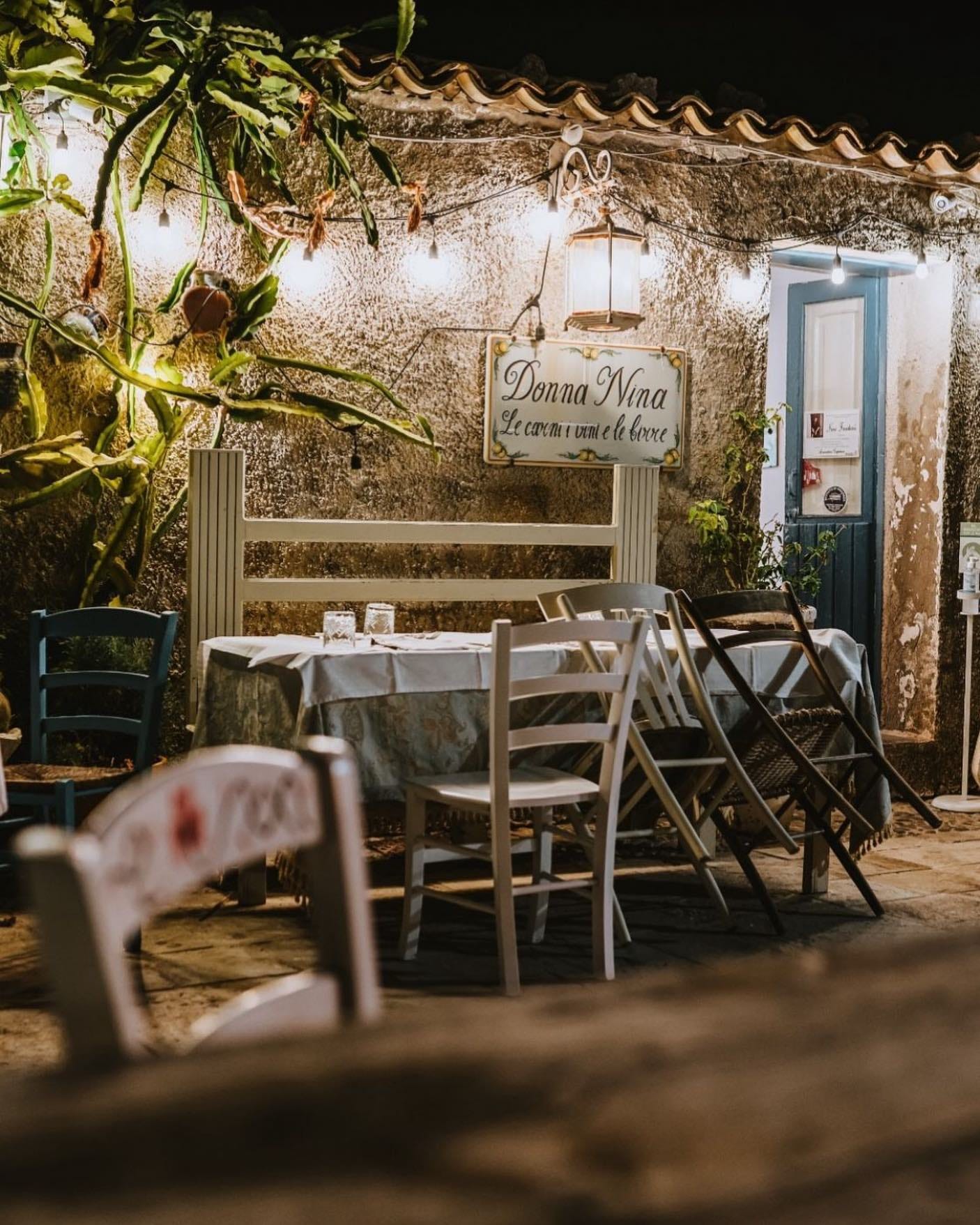
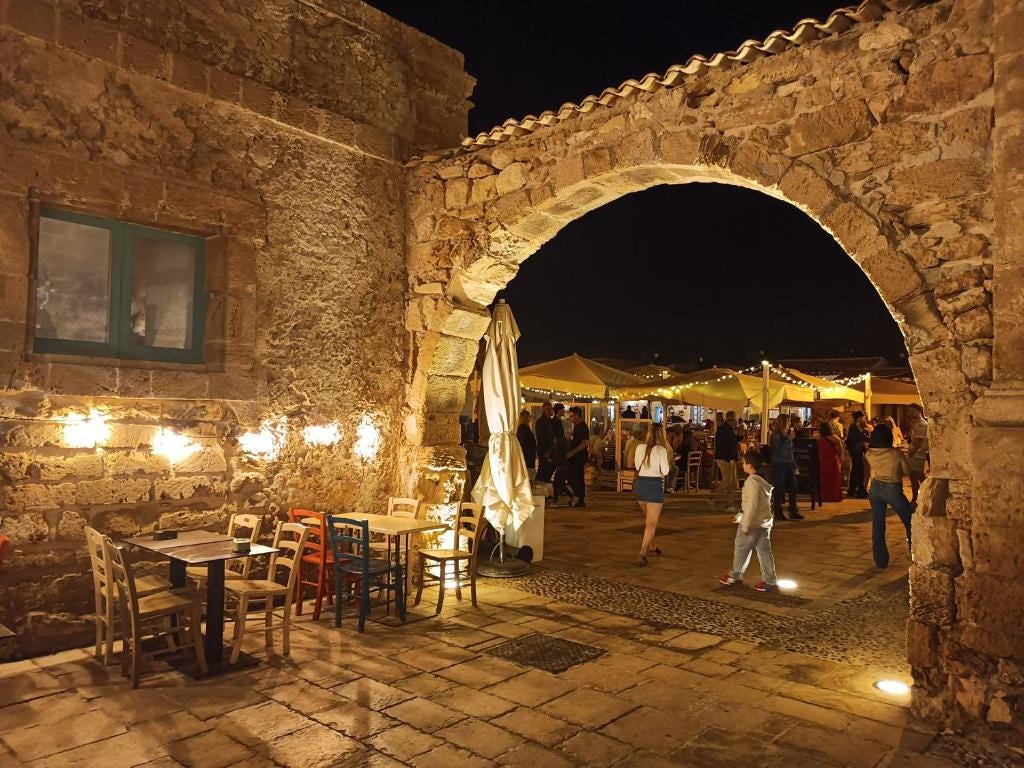
Thank you for bringing this evening to glorious life--your descriptions made me feel truly immersed! I relied on public transport when I went to Sicily--clearly I need to rent a car when I go back!